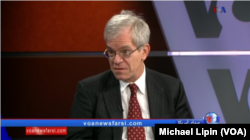A member of a new U.S. coalition of prominent American Jews and Muslims says President Donald Trump’s administration has expressed a strong commitment to fight hate crimes against religious minorities, a pledge that earned the president rare praise from leaders of the two minority groups.
Muslim-Jewish Advisory Council (MJAC) member Robert Silverman, who is Jewish, told VOA Persian’s NewsHour show that his group received assurances of the civil rights commitment from a “very senior” member of the new U.S. administration at a meeting in Washington February 1.
The 38-member MJAC, formed last November, aims to coordinate a strategy to fight anti-Muslim bigotry and anti-Semitism in the United States and to protect the rights of the country’s other religious minorities. The body comprises 19 American Muslim and 19 American Jewish community and religious leaders, business executives and former U.S. lawmakers.
The council members held their closed-door meeting with the Trump administration official as part of their first Washington advocacy day, which also included talks with current members of Congress from both the Republican and Democratic parties. The council’s main priority was to seek federal action to reverse an increase in U.S. hate crimes against Jews and Muslims — action that it says should include federal prosecutions of such crimes.
FBI measures rise in hate crimes
The latest Federal Bureau of Investigation data on U.S. hate crimes, released in November, showed that anti-Muslim crimes rose 67 percent, to 257 incidents, from 2014 to 2015; anti-Jewish crimes rose 9 percent to 664 incidents during the same period.
In a follow-up telephone interview with VOA Persian, Silverman, who also serves as director of Muslim-Jewish Relations for the American Jewish Committee, said he was “extremely reassured” by the council’s recent meeting with the Trump appointee.
“It was an important signal by the new administration of a commitment to work with religious minority groups like MJAC, and a commitment to enforce U.S. civil rights laws,” he said. “We welcomed it, and [the official] got a complete round of applause from the Muslim and Jewish council members.”
The council’s Muslim co-chair Farooq Kathwari, CEO of American furniture manufacturer and retailer Ethan Allen, echoed that sentiment in remarks to The Jerusalem Post.
“It went very well,” Kathwari said of the talks with the Trump administration. “They said that their objective is to make sure people are treated fairly, and that they wouldn’t do anything based on religion. So it was promising.”
Muslim-Jewish group stands apart
The MJAC members’ praise for the new U.S. administration contrasts with major Jewish and Muslim-American organizations’ criticism and condemnation of the White House in recent weeks, in particular for the president’s January 27 executive order to suspend the entry of refugees into America and pause immigration from seven Muslim-majority nations considered sources of terrorism. A U.S. federal judge lifted the travel ban temporarily February 3, in response to legal challenges from critics, who called it unconstitutional. An appellate court is reviewing the issue.
Those critics include the Council on American-Islamic Relations (CAIR), which has denounced Trump’s executive order as a “Muslim ban.” Leaders of the Reform and Conservative American Jewish movements have issued similar denunciations of the presidential order. The White House has denied targeting Muslims and pointed to dozens of Muslim-majority nations whose citizens were not affected by the measure.
MJAC has expressed support for Trump’s critics, saying in an open letter to Congress that it shares their concern “with any bar on refugee or other immigration to the United States based on one’s religion.” However, the council has declined to publicly express opposition to the travel ban.
‘We work together, Americans of good will’
“We are not a protest group,” said Silverman, whose fellow council members include Republicans and Democrats. “We have concerns [with the Trump administration], but we have ways to address them without standing on our heads and turning purple.” He also said MJAC is not operating on an assumption that its relations with the new U.S. administration will go badly. “I think that’s a partisan approach. Rather, we are going to work together, Americans of good will, to live up to our common ideals.”
MJAC’s outreach drew criticism from the Center for Islamic Pluralism (CIP), a U.S.-based research group that challenges Islamist interpretations of Islam.
In an interview with VOA Persian, CIP executive director Stephen Suleyman Schwartz said MJAC has to take a clear position on the travel ban, which he opposes.
“In the middle of a gigantic uproar over the direction of Trump administration policy, the council has to decide whether it will respond to Trump [critically], or play an ameliorative public relations role [on behalf of Trump] that will not go anywhere,” said Schwartz, who also is a columnist for conservative news site The Weekly Standard. “We can’t keep waking up every day asking ourselves how we defend every weird thing the Trump administration has done, if we are going to address radical Islam and help moderate American Muslims get their house in order.”
Silverman appealed to other groups to give the Trump administration a chance to work with the American Jewish and Muslim communities.
“Let’s not start by alienating allies — let’s start by working together with the new government,” he said. “I think people are going to be surprised.” Silverman said the council’s next goal is to start cooperating with state governments whose data collection of hate crimes MJAC wants to help improve.
Parisa Farhadi of VOA's Persian Service contributed to this report.





